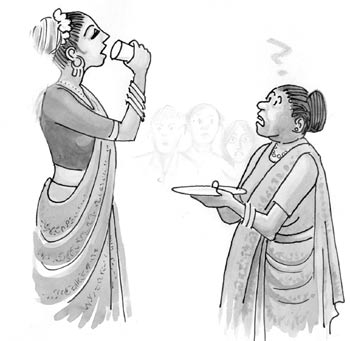WEDDING: I watched my two nangies fix their hair in the reflection of the only mirror in the house. They were putting the finishing touches on their best outfits as they prepared for their cousin's wedding. I stood still with my arms up to the side as my akka wrapped the ornate sari around me to the wedding.
When I had shown my family the plain dam pata (purple colour) sari fabric I had bought in Colombo, my akka insisted I borrow her purple one with beads and sequins instead. "Ruah akka, your sari is nice, but too plain for a wedding" she told me with a sympathetic smile.
Next, I showed my flat sandals with coloured sequins I had brought from New York. This immediately inspired my loku nangie to hand me an extra pair of gold Bata heels two sizes too small for my size 40 feet. "Kamaak nah," was her response: It wouldn't matter because my feet would be covered by the sari.
At the wedding, I observed my beautiful family and all of the guests in brilliant colours and designs. The saris were so amazing that it was even difficult for me to pay attention to anything else! I also realized that wearing a plain sari would have stood out even more than my white skin and blond hair.
As the evening passed through, standing out was the last thing on my mind. Instead, I felt the same hospitality and welcoming feeling I had experienced with host family in their home.
Once I got used to the beauty of the saris, I did my best to absorb other things going around me. As in my village, there were no English speakers at the wedding- at least none that I found amongst the 300 or so guests. So I depended on trusting my host family to explain things to me and follow as best as I could.
After both the bride's and groom's wedding parties had followed in procession to the ballroom, I encountered the first traditions of the wedding. I watched through the crowd as the young couple had their small fingers tied together and the groom drape the red sari around his new wife.
Next, I observed family and friends approaching the couple with sacred Bodhi leaves that would bring good luck. My akka took me by the hand to the front of the crowd and showed me what to do. I felt nervous as everyone watched me hand the bodhi leaves over and bow to pay respect. I guessed I had done it right when I stood up to see smiling faces and nods.
Guests around us mingled as we slowly made our way over to the table to sit with relatives who were inquiring about me. My host family told them my story with pride. My aiya explained his involvement with Sarvodaya and how I was placed in his family while I did my research for my post-graduate degree. I answered as many questions as I had the vocabulary for in Sinhala and let my family finish my sentences when I was stuck for words.
As I continued conversation with those around me, I ached to quench my thirst on the hot April day. As I had only recently become healthy after a long period of sickness, I was careful not to drink the tap water. I excused myself and found a waiter to ask for "unu watura" (boiled water). I waited for a while and asked another waiter, who told me I could return to my table and wait for it there.
Several minutes later, the father of the bride walked over to me with a cup of water on a silver platter. He moved the platter towards me and smiled. I felt shy and embarrassed to think that he had gone through the trouble of getting me boiled water. I thanked him for being so kind.
I took the glass with two hands - as I have learned is more respectful - and drank from it. It was cold. I wondered, did they have the water already prepared? I kept the thoughts to myself and looked up at the father with a smile. His expression changed to one of confusion, as did mine as I looked back at him. I watched him walk away briskly only to return to the table next to us with another glass of water. I turned to my akka for an explanation.
She was engaged in conversation with her cousin, and the two of them shifted their attention to me. Once I relayed the story, they started laughing. I had just drank the glass of water symbolizing the invitation to eat! The father of the bride returned to our table, and this time offered the cup to the other guests at the table.
I apologized to him for the mistake, and he told me "kamak nah." Everyone at the table laughed and looked pleased as they watched me respond in the polite way to accept the invitation by touching the platter with both hands. "Shall we go and eat?" my aiya asked. I nodded and joined my family to wait in line at the aromatic buffet of mouth-watering Sri Lankan cuisine.
http://www.dailynews.lk/2006/07/27/fea4-01.asp


